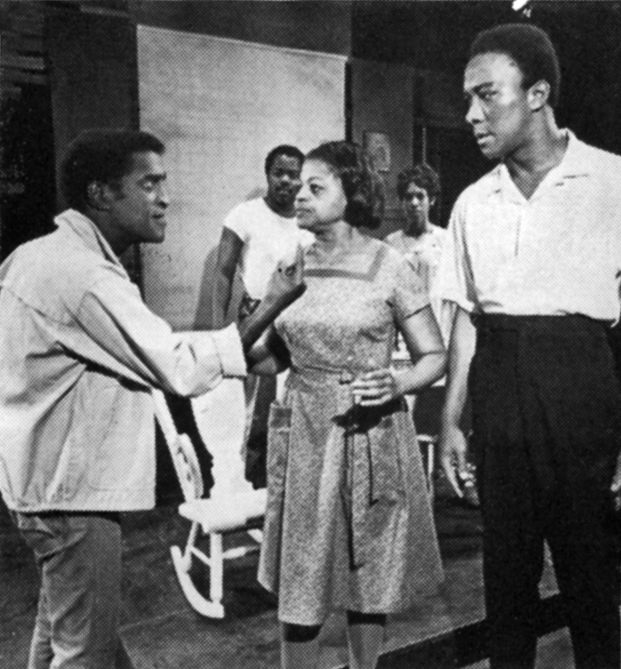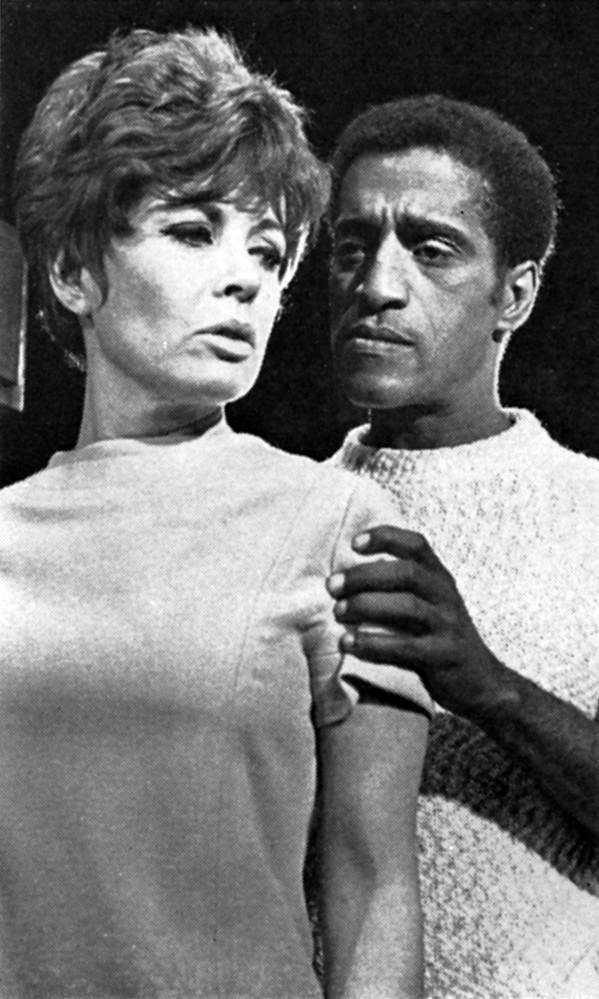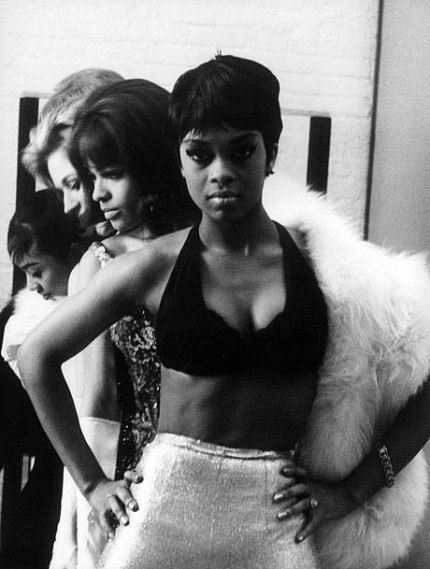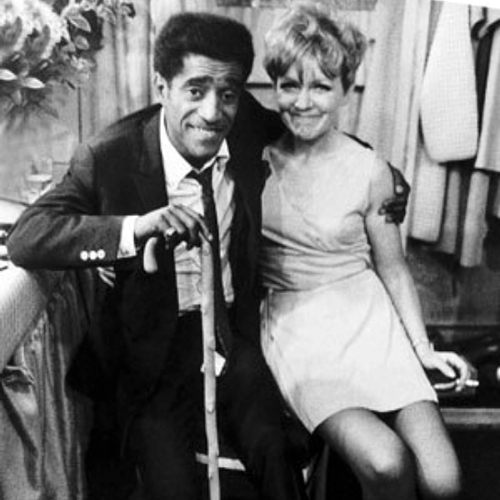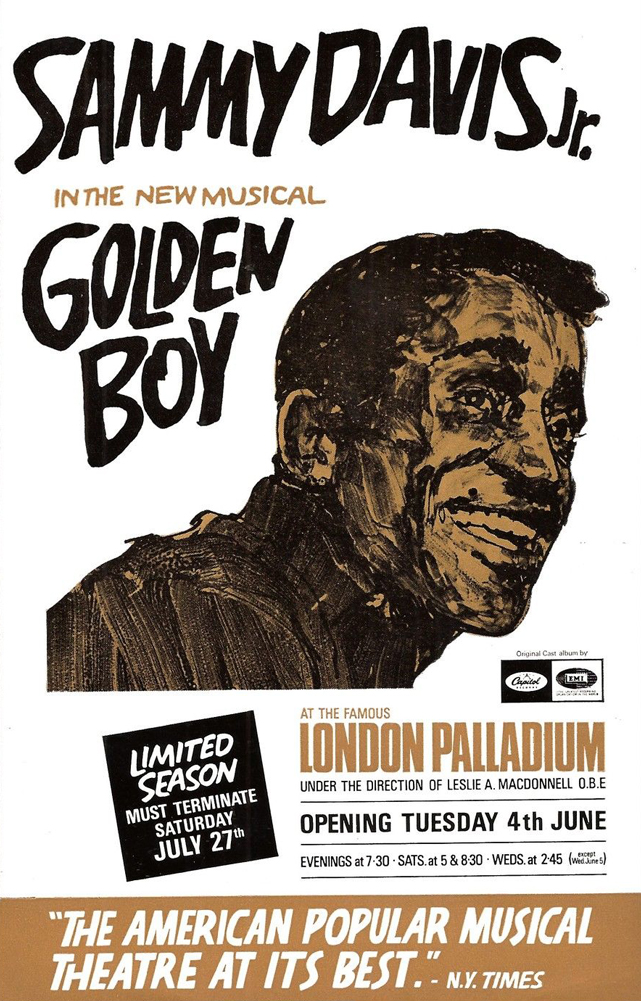Golden Boy (West End) |
| Opening Date: 4 June, 1968 / Closing Date: 14 September, 1968 Performances: 118 performances Venue: The London Palladium, London Producer: Hillard Elkins / Director: Michael Thoma Cast: Sammy Davis, Jr., Gloria DeHaven / Vivienne Martin, Lon Satton, Louis Basile, Mark Dawson, Hilda Haynes / Ida Shepley, John Bassette, Frank Nastasi, Altovise Gore, Al Kirk, Tony Catanzaro / John Gorrin, Lola Falana. Book: William Gibson (and Clifford Odets) Music and Lyrics: Charles Strouse and Lee Adams Musical Director: Shepard Coleman Tryouts: Auditorium Theatre, Chicago – 23 April to 25 May, 1968 |
Details
When Producer Hillard Elkins agreed to the request of Sammy Davis, Jr. to halt the run of the musical Golden Boy on Broadway in March 1966, despite the fact it was still selling well, he did so on the proviso that Sammy would later headline a run of the show in London’s West End. After a couple of years on the road, Sammy agreed to set aside time in 1968. But times had changed since Golden Boy’s interracial love story, an adaption of Clifford Odets’ 1930s play, had been so chaotically cobbled together in the late winter of 1964.
The civil rights movement, symbolised by Martin Luther King, Jr., was giving way to a black power movement more symbolised by the Black Panthers. Elkins and Sammy both realised that the show needed a significant revision, especially considering that before heading to London, Elkins’ plan was for the new version of Golden Boy to have tryouts for a month in one of America’s most segregated cities, Chicago. Playwright William Gibson had rescued the 1964 production (when Odets died after completing only a couple of drafts of the adaption), and so Elkins and Sammy asked him to complete a re-write of his own previous work. Sammy estimated that 60 percent of the show was ultimately changed.
The interracial love story remained, but the role of Joe’s brother, Frank, was greatly expanded. In the 1964 version, Frank was a civil rights worker and only a minor character, whereas in the new version he was a militant black nationalist, who tells Joe to fight for something meaningful. Sammy described the brothers as “two black males, with their own individual ways of trying to find their place in the world”. The show – now utterly unrecognisable from the 1930s play – was no longer a ‘boy loses girl’ story, but had a new specific message according to Sammy: “Violence isn’t it, and servitude isn’t it.”
None of the principal cast members returned except Sammy, but several of the chorus dancers did – most notably Lola Falana, who at the time was romantically linked with Sammy. Gloria DeHaven was cast as Lorna, in the role that Paula Wayne had previously played on Broadway. Where Wayne had been ten years younger than Sammy, DeHaven was the same age as Sammy, 42. Lon Satton was cast as the exploitative promoter Eddie Satin, Mark Dawson as Sammy’s white manager, and Al Kirk as Frank. The character of Joe’s father was altered to become his mother, with Hilda Haynes cast in the role, named Ma Wellington. 25 year-old Altovise Gore played the role of Joe’s sister, Anna.
Additional changes were made to the score. “Gimme Some”, “Stick Around”, and “While The City Sleeps” were dropped, while “There’s A Party Going On” and “Yes I Can”, which had been eliminated back in 1964 during the show’s tryouts in Philadelphia, were brought back. “No More”, the gospel song of defiance, was given to Frank. Charles Strouse and Lee Adams wrote two new songs for the production: “You’re No Brother Of Mine”, in which brothers Joe and Frank argue, and “What Became Of Me?”, which closed the show. Sammy would record the latter for Reprise the following year.
Rehearsals began in March at the George Abbott Theatre in New York. Toward the end of the month, Sammy filled in for Johnny Carson by guest-hosting The Tonight Show for a week. Shortly afterward on 4th April, news broke of the assassination of his friend Martin Luther King, Jr. Sammy went on the three television networks and, in vain, called for calm and discouraged rioting. Rehearsals were postponed as Sammy flew to Atlanta for the funeral. Meanwhile, riots continued across the nation, notably in Chicago, where Golden Boy was headed in just two weeks’ time.
Chicago
The first previews at the Auditorium Theatre in Chicago were cancelled due to the delayed rehearsals, but the show opened as planned on 23rd April. Outside the theatre, Chicago still smouldered from the fires lit by days of rioting. Over 20,000 police, soldiers and National Guardsmen patrolled the streets, and Mayor Richard J. Daley had authorised police to shoot to kill arsonists and shoot to cripple looters. Inside the theatre, Sammy and company were performing a musical about an interracial couple fighting for acceptance. Sammy wrote in Why Me?: “While the ghetto burned, we were fiddling with an interracial musical.”
Golden Boy was hardly escapism for its attendees; Robert Pollack’s review in the Chicago Suburbanite Economist highlighted the grim tone of the show: “Any warm day now you can expect somebody to make a fey musical out of Oedipus Rex, the history of the John Birch Society or the execution of Czar Nicholas II. This painful observation is inspired by Golden Boy, the incumbent at the Auditorium, which sees the following: Two brothers who hate each other very much. A son who neglects his mother. A fatal accident in a boxing match. A song, “No More”, in which a black power advocate tells what he’s going to do to us honkies. A doll who two-times her lover and two-times his successor. A street fracas between whites and blacks. A boxing manager who will stoop to murder if necessary.”
But Pollack wrote of Sammy’s performance: “Nevertheless there is always the star. Looking like a miniature Assyrian deity even in boxing trunks, he sings his heart out, dances like a demon and acts the role of Joe Wellington, a crazy-mixed-up kid, like a master of his craft. Sammy Davis, Jr. is one of those naturals who appear once in a generation. He can do no wrong on stage. His personal magnetism is so strong that it reaches up to the Auditorium second balcony. To see a superb artist hold 3,600 people in the hollow of his hand is a considerable theatrical experience.”
On the basis of Sammy’s performance, the show was selling out so regularly it had to be extended a week beyond its planned run. But the content of the musical itself still variously earned the disapproval of both white and black audience members. Sammy wrote “I was thoroughly included in the hatred felt in Chicago for the blacks … in the scene where the white girl refused me, people would applaud.” Security was tight. Meanwhile, in an era of black power, black attendees saw in Joe a character willing to lose everything for the love of a white woman, which they viewed as selling out.
Sammy distributed free tickets to members of the black community, and invited black attendees onto the stage after the show to discuss what they had seen. He actively courted the viewpoint of the local Black Power leaders, meeting them backstage, and at his hotel. He met with ghetto gangs like the Blackstone Rangers and the Commandos. Generally, they viewed him as something of an Uncle Tom, but a dialogue was opened, and Sammy tried to understand their experience while struggling to reconcile it with the non-violent approach of King. Changes were made to Golden Boy to further accommodate a more radical viewpoint.
When not on stage, Sammy channelled his energy into something he felt would ultimately assist to address the injustice being felt by these communities: he campaigned for Robert F. Kennedy for President in the Democratic primaries. Sammy was far closer personally to RFK than he had ever been to John F. Kennedy. During the day, Sammy would fundraise in Illinois, or head to small colleges in nearby Nebraska and Indiana to stump for Kennedy. Kennedy won both the Indiana primary (7th May) and the Nebraska primary (14th May). On the 25th May, Golden Boy tryouts finished in Chicago and the company headed to London.
London
There was only one location Sammy would countenance appearing at in London, and that was the famous London Palladium. It was one of his favourite venues, ever since a record-breaking run there in April of 1963. Golden Boy would be the first time a book musical had played at the storied venue. While the musical’s interracial message caused less controversy in Britain than in Chicago, the show was nevertheless picketed at times by Nazi groups and security was tight. But Sammy had built an enormous personal following in the UK, and the Hollywood Reporter recorded that the entire planned run was sold out – a first in Palladium history.
Although the musical numbers had been changed since 1964, the new slate of songs still saw Joe Wellington singing in 11 of the 17 numbers, and the unusually heavy load for a lead performer led to the same issues with Sammy’s voice that he had suffered at the beginning of Golden Boy’s Broadway run four years earlier. He had cancelled a couple of shows in Chicago citing laryngitis and was not in the best voice for opening night in London. However, the London critics considered Golden Boy a knockout regardless.
Irving Wardle wrote in The Times: “Arthur Penn’s direction is a superb example of the coordination of speech, song and dance in a continuously developing theme. The impact of the big production numbers is tremendous.” W. A. Darlington wrote in the Daily Telegraph: ”The whole thing crackles with energy. It has in fact all the virtues of mechanical perfection which we expect of the more high-powered American musicals.”
Lola Falana in particular was singled out for praise – she had been given a featured role in the dance sequences. Herbert Kretzmer wrote in the Daily Express: “An electrifying girl dancer named Lola Falana was absolutely riveting. She is the golden girl of Golden Boy. The finest dancer to come to London in an American show since Chita Rivera took the town by storm in West Side Story.”
The day after opening night, word arrived in London that Robert Kennedy had been shot in Los Angeles. While Kennedy’s death was not announced until the day following, Sammy knew from conversations with his friend, Peter Lawford (Kennedy’s brother-in-law), that Bobby had died. He tried to go through with that evening’s performance, but after intermission, Sammy appeared on stage in his boxer trunks to announce that he could not continue. He explained that his spirit was in the States with Kennedy, and urged the audience to consider Golden Boy’s message of freedom and racial equality, and to pray for Bobby when they returned home.
Extended run

Sammy with Vivienne Martin
The production did excellent business and was extended from its original closing date of the 27th July to the 14th September. Cast changes were made and since Gloria DeHaven had other commitments, the production was left without a leading lady. Producer Richard Mills recommended New Zealand actress Vivienne Martin, a veteran West End performer who had headlined The Matchgirls. According to Martin, Sammy saw her audition at the Palladium, but left her to rehearse with his understudy Lon Satton, and didn’t even speak to her before her first performance. Martin met Sammy for the very first time walking onto stage to perform.
It was a sign of the decreasing care Sammy was showing for the production: Sammy’s friends were being assassinated, he had been ostracised by elements of both black and white communities in the USA, and in mid-August his wife May Britt officially filed for divorce (although Sammy and May had been separated since the spring of 1966, his public relationship with Lola Falana had presumably led May to formally end the marriage). In addition, he was never in perfect health during the show – suffering continued problems with his throat, and occasionally getting injured in the show’s strenuous boxing scenes.
Sammy’s coping mechanism was to embrace the ‘swinging London’ culture of sex, drugs and rock-and-roll. He had a luxury suite on the roof of the Playboy Club, loaned to him by Hugh Hefner, and started hosting parties there with what he referred to as “my ‘lower social group’, the rockers – Jimi Hendrix, Mama Cass, guys from the Stones”. He wrote in Why Me?: “I got deeply into drinking and partying … anything to not feel anything … that whole segment of my life was an effort to blot out reality.”

Tom Markwick outside the Palladium
Sammy also kept his reputation as a spendthrift around town intact – one night late in the show’s run, in the middle of Act II, private detective Tom Markwick walked down the aisle of the theatre and leapt onto the stage, walked over to Sammy and served him a writ for non-payment of goods from London stores.
While in London, Sammy befriended Altovise Gore, who was playing the role of Joe’s sister Anna in the show, and the two began spending time together. When Golden Boy finally closed in September, and Lola Falana decided to concentrate on building her own solo career, Sammy took off to tour Europe with Altovise replacing Falana as a ‘mistress of ceremonies’ in his act. Two years later, Sammy and Altovise were married.
MUSICAL NUMBERS
1. Workout – Boxers
2. Colorful – Joe
3. Night Song – Joe
4. Everything’s Great – Tom, Lorna
5. Lorna’s Here – Lorna
6. There’s A Party Going On – Joe, Lorna
7. Don’t Forget 127th Street – Joe, Frank, Ronnie, Company
8. The Road Tour – Joe, Lorna, Tom, Roxy, Eddie, Tokio, Company
9. This Is the Life – Eddie, Joe, Company
10. Yes, I Can! – Joe
ACT 2
11. Everything’s Great (Reprise) – Lorna
12. Dance Trio – Lopez, Les, Baayork, Ensemble
13. I Want To Be With You – Joe, Lorna
14. You’re No Brother of Mine – Joe, Frank
15. No More – Frank, Company
16. The Fight – Joe, Lopez
17. What Became of Me? – Joe





